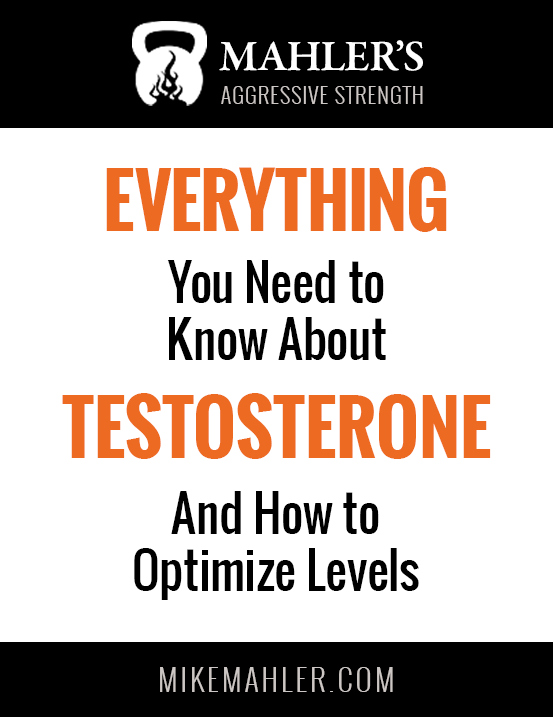Any increase in testosterone and growth hormone you derive from training is not going to last long enough to be impactful. In fact, a study a while back conveyed the post-workout increase in anabolic hormones doesn’t have an impact on stimulating muscle growth from the actual session. This doesn’t mean that the augmentation of anabolic hormones from training is worthless. Stimulation of growth hormone and testosterone from a training session is a positive sign of a productive workout. It indicates you’re leaving the workout in a thriving state rather than being depleted with excess cortisol. In addition, it is much easier to make training part of your routine if you’re actually making progress and not completely wiped out after every workout.
What to avoid post-training is a decrease in testosterone and growth hormone. One method to support the post-workout increase in anabolic hormones and minimize the increase in catabolic hormones is to keep intense training sessions to forty-five minutes or less (doesn’t include warming up or post-training stretching). This is a practice I picked up from Leo Costa author of the Serious Growth and Big Beyond Belief manuals both based on what he learned from the Bulgarian weight lifting team and applied for the purpose of maximizing muscle growth.
To avoid the post-workout drop in anabolic hormones, the Bulgarian weight lifting coaches would have their athletes train several times per day and keep each session way below forty-five minutes. While training twice per day or more with several hours in between the sessions can accelerate training progress, it is impractical for most people but something to keep in mind if you go through a period with more time on your hands. For most, three to four forty-five minutes or fewer sessions is doable. Prioritize compound exercises such as deadlifts, squats, dips, pull-ups, and kettlebell swings and avoid majoring in minor things. Charles Poliquin once said if you’re in the gym for more than an hour, you’re socializing not training. Avoid taking selfies after every set and no need to look at your glutes in the mirror after each set of deadlifts as progress doesn’t happen that fast.
Post-workout nutrition also plays a significant role in mitigating catabolic hormones and inducing recovery. You don’t have to have a protein shake immediately after training to support recovery. A study mentioned on Super Human Radio a while back revealed that post-workout nutrition consumed within four hours of a training session is adequate.
What I like to do post-workout is have five capsules of my systemic enzyme supplement Restorezyme. Systemic enzymes lower inflammation and the subsequent release in cortisol to reduce inflammation. Enzymes don’t suppress the immune system to lower inflammation the way fish oil does. Instead, enzymes support healing so you don’t require an aggressive inflammatory response. Enzymes post-training help lower the need for a cortisol release and are by far my favorite recovery supplement. Check out Dr. Wong’s article on the topic at Fighting exercise-induced inflammation, cortisol increase, and catabolism An hour after consuming the enzymes, I have a post-workout meal which sometimes is an early dinner or a protein shake.
More important than an increase in testosterone and growth hormone from training, is going into a training session with optimal levels of testosterone and growth hormone. As we get older and accumulate more mileage this can become a daunting task. if you have poor sleep habits you can forget about having optimal anabolic hormone production as well as the crucial insulin and leptin sensitivity. The more intense your training sessions become, the more important sleep becomes as well as restoration practices such as regular sports massages.
My Aggressive Strength Testosterone Booster also helps support optimal levels of testosterone and growth hormone (Mucuna Pruriens in ASTB is a growth hormone secretagogue) and is highly beneficial for the over forty crowds in particular who want to continue to enjoy intense training and more importantly, progress from intense training. At forty-six, I am still getting stronger and I have been training since I was eighteen. Eating healthy, managing stress well, enjoying my career, and having a great personal life are the main reasons for this. However, taking advantage of high-quality supplements that actually work is also an integral part.
As you get older, your anabolic hormone production will decrease and it will have a negative impact on not just your training but your quality of life. Take the time to learn about the importance of optimizing hormones by reading the free info on my site at hormone optimization articles and if you really want to have a thorough understanding of hormone optimization, get my eight-hour lecture series on the topic Hormone Optimization Lecture Series

